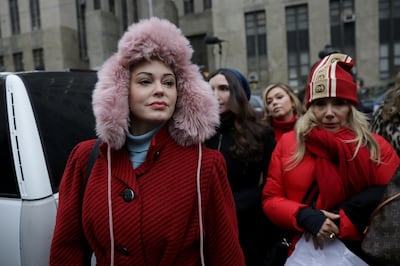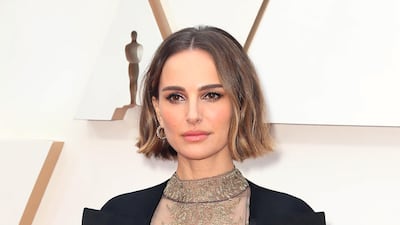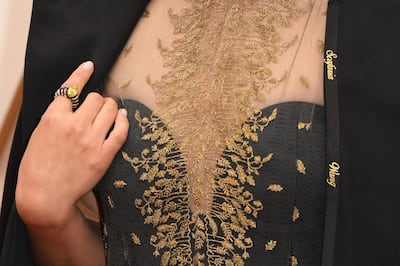At the Oscars on Sunday, Natalie Portman made a style statement with her Dior cape, which was embroidered with the names of female directors who were notably omitted from the list of Best Director nominees, an award that Bong Joon-ho went on to win.
The cape's golden detail listed the likes of Lorene Scafaria (Hustlers), Lulu Wang (The Farewell) and Greta Gerwig (Little Women), among others.
"I wanted to recognise the women who were not recognised for their incredible work this year in my subtle way," the Black Swan actress said of her sartorial statement. Portman has form when it comes to calling out gender bias in Hollywood. At the 2018 Golden Globes, she said: "And here are the all-male nominees", while presenting the Best Director award.
Largely, critics have applauded the statement, but Rose McGowan branded Portman “the problem”.
“Natalie, you have worked with two female directors in your very long career - one of them was you. You have a production company that has hired exactly one female director, you,” she said in a Facebook post.
“You ‘A-listers could change the world if you’d take a stand instead of being the problem. Yes, you, Natalie. You are the problem. Lip service is the problem. Fake support of other women is the problem,” McGowan added.
“I find Portman’s type of activism deeply offensive to those of us who actually do the work. I’m not writing this out of bitterness, I am writing out of disgust.”
McGowan touches upon the fact that Portman has worked with a string of male directors, and yes, it is impossible to ignore the imbalance.
When it comes to feature films, she worked with Rebecca Zlotowski on The Summoning in 2016, one year after she directed herself in A Tale of Love and Darkness. The two other female directors she's worked with in her 26-year career are: Marya Cohn in the 1994 short film Developing and Vanita Shastry in the 2015 anthology movie The Heyday of the Insensitive Bastards. Portman featured in Shastry's Lacunae vignette.
And while the urge to call Portman out is real, to call her the "problem" is neither productive nor accurate, in my opinion.
'Female films are incredibly hard to get made' says Portman in response
The fact that Portman has worked with 44 male directors, compared to the three females, is more indicative of the fact that there just aren't enough scripts and projects of substance being green-lit for female directors. Portman directing herself in 2015 and then choosing to work with Zlotowski a year later is certainly indicative of this.
In response to McGowan's post, Portman said in a statement to BBC News: "It is true I've only made a few films with women. In my long career, I've only gotten the chance to work with female directors a few times - I've made shorts, commercials, music videos and features with Marya Cohen, Mira Nair, Rebecca Zlotowski, Anna Rose Holmer, Sofia Coppola, Shirin Neshat and myself. Unfortunately, the unmade films I have tried to make are a ghost history.
"Female films have been incredibly hard to get made at studios, or to get independently financed. If these films do get made, women face enormous challenges during the making of them,” she added. “I have had the experience a few times of helping get female directors hired on projects, which they were then forced out of because of the conditions they faced at work.
"After they are made, female-directed films face difficulty getting into festivals, getting distribution and getting accolades because of the gatekeepers at every level.
"So I want to say: I have tried, and I will keep trying. While I have not yet been successful, I am hopeful that we are stepping into a new day."
Name recognition an issue for women directors
It is even more telling that of the female directors Portman has worked with, only she is a household name. The long list of men, meanwhile, is filled with names that even the most casual of movie-watchers will recognise: Taika Waititi, Kenneth Branagh, Tim Burton, George Lucas and Woody Allen.
Hollywood's lack of interest in a female story is a problem that Salma Hayek has spoken out about in the past, particularly in relation to Frida, the 2002 biopic of the Mexican artist's life. A film it took Hayek 14 years to finally get on the big screen.
“Women don’t have enough voice and we can’t express who we are. We need to see ourselves,” she said in a conversation in 2015, about female roles in Hollywood.
“We need to show them that we are an economical force. They have not discovered it because they are caught up in their macho stuff. The minute they see the money in this the business, it will be instantaneously different.
"The only two industries where women make more money than men is fashion and pornography and in those we are treated as sexual objects," added Hayek. "This is an ignorant way of looking at who we are. We don’t want to watch things that promote us as sexual objects.”
Reality check: Portman needed to work with male directors to build a career
To me, backdating Portman's career to accuse her of lip service, as McGowan has, seems futile. For her to turn down roles with male directors would have achieved absolutely nothing, and she certainly wouldn't have had the star power to make these kinds of headline-grabbing statements without Stars Wars, Avengers or Black Swan under her belt – all of which, of course, were directed by men.
McGowan herself has worked with more than her fair share of male directors. It is impossible to find a household name in Hollywood who hasn’t. And although she has worked with considerably more female directors than Portman, McGowan, too, has had to direct herself in a number of projects, an indication that they wouldn’t get off the ground if she weren't there as the driving force.

Tearing female stars down for working with men isn’t the solution. Many are creating incredible pieces of cinematic art that we should all be entitled to see and that actors, irrespective of gender, should be entitled to star in.
But there should be an onus on powerful women in Hollywood to seek out interesting stories told by women, about women, and help them get onto the big screen, and I choose to believe that that is what Natalie Portman will focus the next era of her career on.
So, in that light, I read her cape as a calling card. A call out to all the female directors in Hollywood that she could, and hopefully will, work with in years to come.



